Discovering a life that truly matters in Yunnan
They escaped to “a place with winds” and left their weariness behind. They joined the joyous celebrations in “villages with water,” and shared stories around the fire in cozy “farmhouses with fireplaces.” International friends are embracing “a life that begins in nature and returns to simplicity”—the many-splendored life in Yunnan. Discover their yearnings as we invite you to live and travel in Yunnan alongside these inspiring expats.
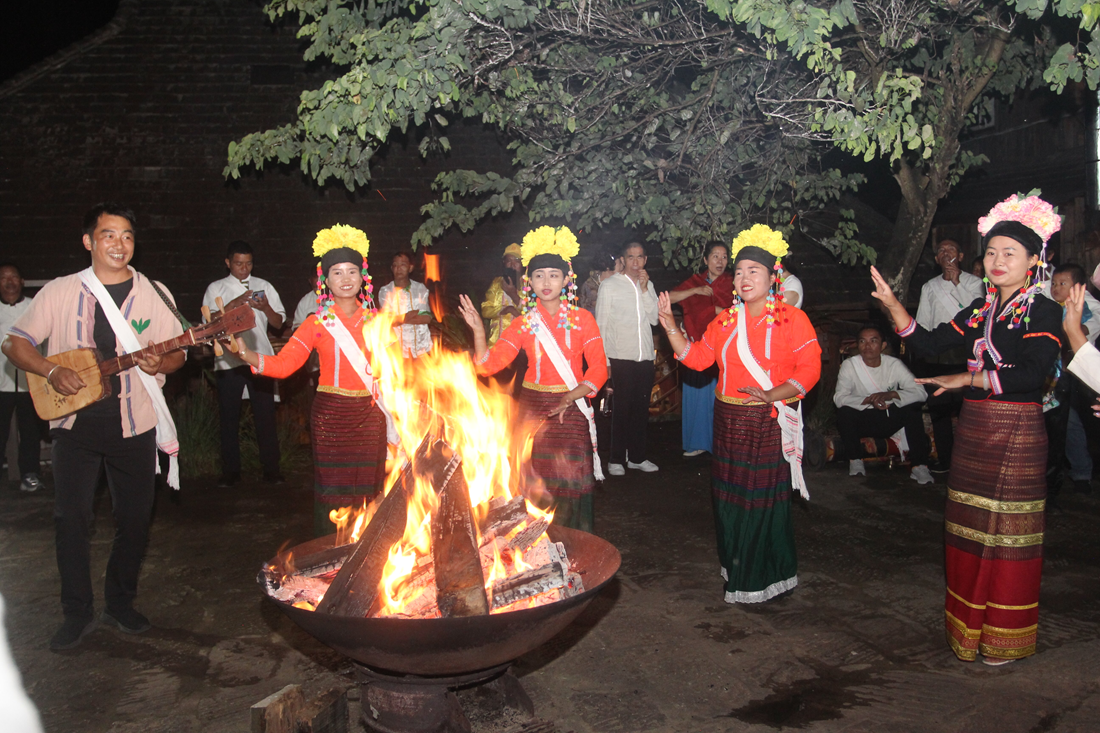
A group dance goes on at the Jingmai Mountain in Pu’er.
Lee Barrett (UK): A beautiful connection has just begun
By Zhang Min
The evening of February 22 was electric outside the Yuxi Plateau Sports Center in Yunnan Province, as music and cheers blended into a joyous celebration. British travel blogger Lee Barrett, arriving in this vibrant atmosphere, was immediately caught up in the football fever, instinctively moving to the beat. He was there specifically for Yunnan Yukun team’s Chinese Super League (CSL) debut. Before the match, Lee Barrett enjoyed the local Long Street Banquet and then captured his first moments at the CSL arena with his action camera.
Lee Barrett was captivated by the vibrant scenes along the way, constantly snapping photos and interacting with the enthusiastic fans. Inside the fan shop, he filmed the dazzling merchandise, describing it to his viewers. Entering the stadium, Lee Barrett joined thousands of cheering fans to witness Yunnan Yukun’s historic “triple jump” in four years, excitedly shouting in his newly learned Yunnan dialect: “Yukun, Banzha!” (“Yukun, awesome!”)

Lee Barrett travels to Jingmai Mountain in Pu’er.
After the match, Lee Barrett’s Yunnan journey took him to Jingmai Mountain in Pu’er, where the shifting morning mist marked a new chapter. In the ancient tea forests, Bulang ethnic tea farmers were harvesting the spring tea. Lee Barrett then sampled the sweet, non-bitter Pu’er tea, which prompted him to exclaim: “I’ve had Chinese green tea and black tea before, but this is my first time drinking Pu’er tea. Jingmai Mountain tea is very delicious, the taste is very sweet, it doesn’t feel bitter, it’s really good.”
Lee Barrett marveled at Jingmai Mountain’s leisure, pristine nature, and stunning beauty—where the indigenous ethnic groups have been guarding the ancient tea trees for generations. These ancient trees are like guardians of time, quietly standing in the misty mountains, each leaf carrying the weight of history and the bounty of nature.
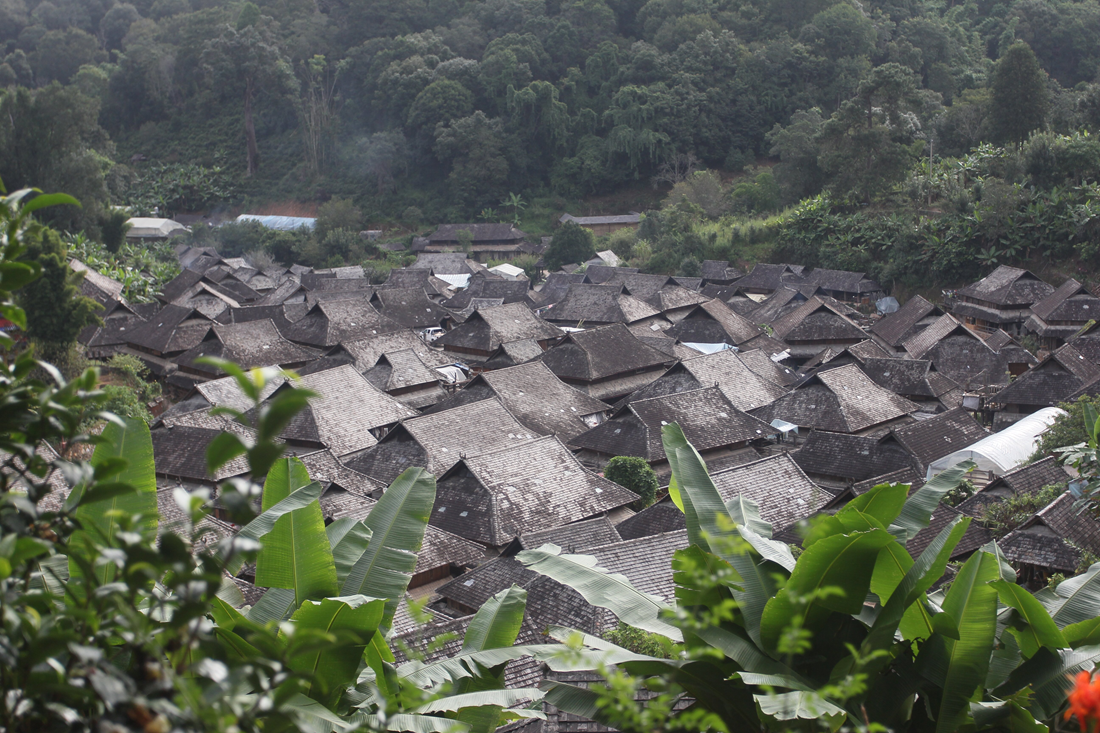
An ancient village at Jingmai Mountain in Pu’er
In this idyllic environment, Lee Barrett experienced a powerful sense of harmony between humans and nature. Despite the language differences, he found an easy connection with the Dai and Bulang villagers through shared smiles, nods of understanding, and sincere compliments. He came to realize that Jingmai Mountain represented more than just beautiful scenery; it was a living story of cultural preservation, environmental stewardship, and community harmony. And this was just the start of Lee Barrett’s personal journey with Yunnan.
Fernando Munoz Bernal (Colombia): Exploring Yunnan by RV
By Wang Jingzhong
RV travel is booming, especially among younger generations. Equipped with the comforts of home, RVs offer the freedom to roam, spontaneous adventures, and the ability to call any location home base—an attractive prospect for many travelers. So, what is it like to explore Yunnan by RV? Fernando Munoz Bernal, or Gao Fei, as he calls himself in Chinese, has some insights to share.
Fernando, a Colombian travel enthusiast and video blogger, first visited China in 2000 and immediately fell in love with the country. Now he teaches English online while documenting his travels and daily life across China in videos, which he shares on various social media platforms both domestically and internationally. Having lived in Dongguan, Guangdong for a significant period, he was recognized as an honorary citizen of Dongguan in 2011.

Fernando Munoz Bernal enjoys a snack in Yunnan.
In late 2021, Fernando and his Chinese wife purchased and renovated an RV, transforming the compact space into a comfortable home on wheels with a stove, refrigerator, sofa, dining table, and other essential amenities. “We started in Guangdong and traveled through Guangxi, Yunnan, Xizang, Xinjiang, Gansu, Shaanxi, and more. The stunning natural landscapes and diverse cultural heritage we encountered along the way were incredible,” he recalls.
Fernando holds particularly fond memories of his December 2022 trip to Yunnan. On his first visit to the province, he explored Wenshan, Honghe, Pu’er, Xishuangbanna, Yuxi, Kunming, Chuxiong, Dali, Lijiang, Diqing, and numerous other destinations. He diligently documented the beauty he found, capturing the images of black-headed gulls at Laoyuhe Wetland Park and filming a group of elderly people dancing the Yi ethnic left foot dance in Kunming Old Street.
He even put down his camera to join the dancers. “The people of Yunnan truly know how to enjoy life. Their genuine happiness is palpable,” Fernando observed, highlighting the well-developed RV tourism infrastructure throughout the province. He noted that RV campsites in every city offer “one-stop” services for self-driving travelers, including vehicle maintenance, supplies, catering, and outdoor activities, creating a welcoming and communal environment for rest and connection.
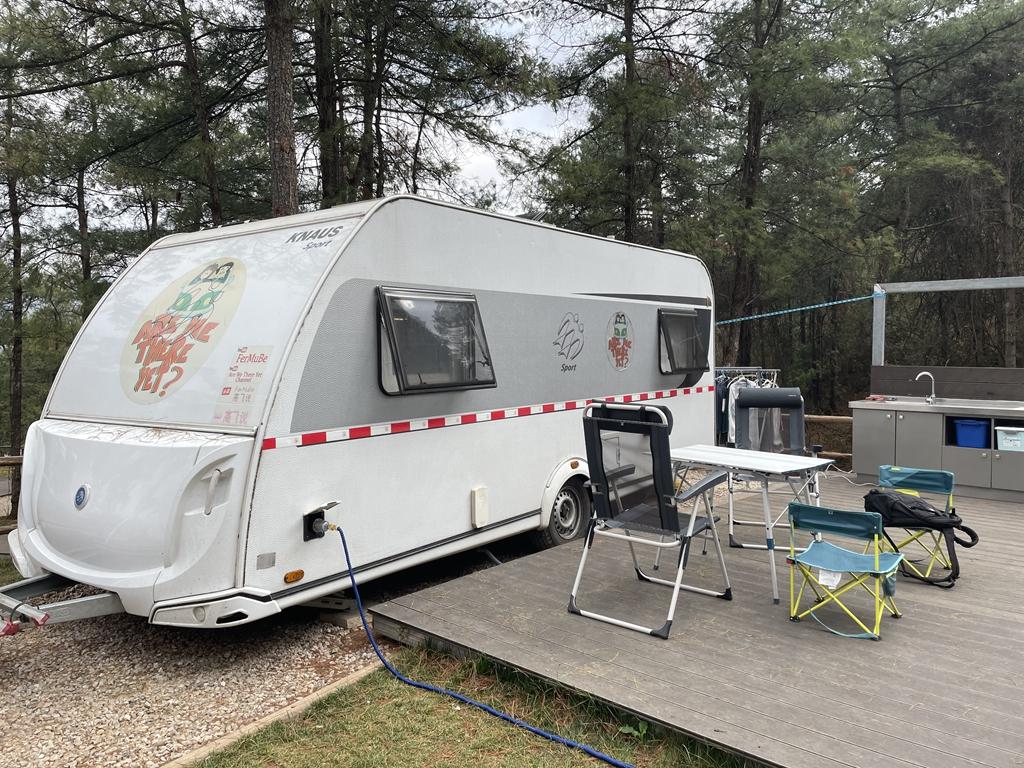
Fernando Munoz Bernal explores Yunnan by RV.
In 2024, Fernando incorporated much of his Yunnan footage into a documentary, showcasing his enduring affection for the province.
“I’m already planning my next trip to Yunnan,” he enthuses.
Gil (France): Seeking a location to establish roots
By Chang Yuan
Gil, a Frenchman who’s lived in China for over a decade, now calls Panqu Village in Dali, Yunnan home. Settled there, he runs a private kitchen and is known to locals as “Xiaosong.”
Gil’s private kitchen offers a unique dining experience: there is no fixed menu, and he hosts a maximum of two tables per week (minimum eight guests per table), with advance reservations required. His cuisine blends French, Spanish, and Yunnan influences, using a rich variety of ingredients to create a “blind box” of flavors for his diners.
A journalist and photographer with 20 years of experience, Gil lived in Beijing and Chengdu for nine years before settling in Panqu Village, Dali, in 2014, where he moved into a stone courtyard.
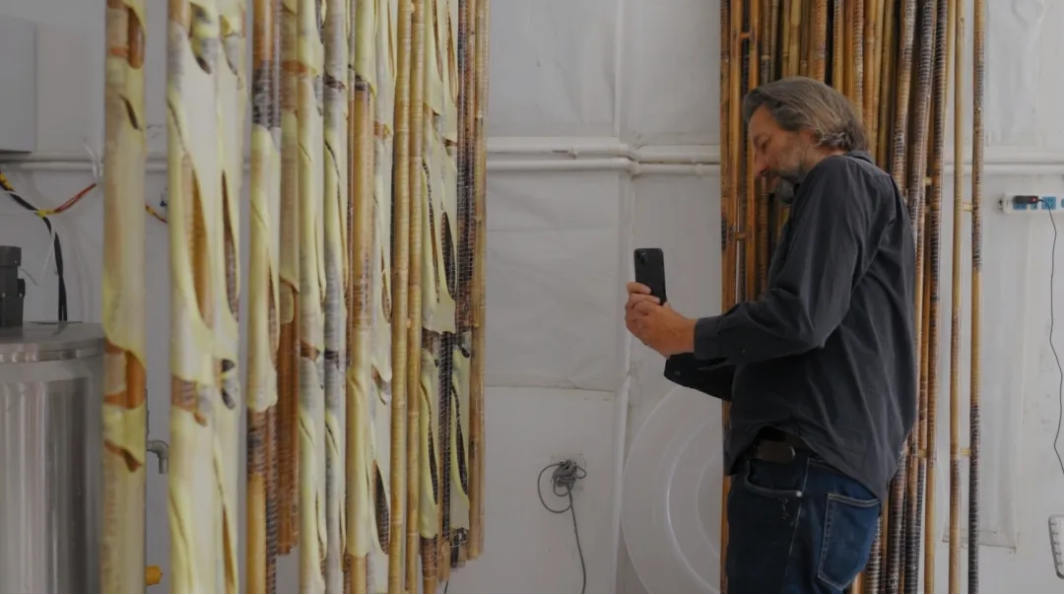
Gil has a relaxing life in Panqu Village in Dali, Yunnan.
In his free time, Gil often stands in his courtyard, gazing at Cangshan Mountain. “Growing up at the foot of the Alps, I feel an inexplicable closeness to Cangshan,” he said. The warmth of the locals, combined with the beautiful scenery, creates a unique connection between Dali and France, allowing Gil to feel truly at home.
After settling in Dali, Gil maintained his passion for writing, while occasionally showcasing his cooking talents for friends. It was at their urging that he eventually opened his private kitchen, a venue where he could fully explore his forte: crafting innovative Western dishes with local ingredients.
“The dishes I create reflect my writing and my life here,” Gil explains. In Dali, this translates to dishes like “Panqu Sushi”—rubing (a local milk pastry) topped with roasted sweet peppers. He also reimagines the French sandwich by wrapping Dali Baba (local pancake) around rushan (fan-shaped cheese) and lettuce salad, replacing the traditional baguette and cheese.
For Gil, integration begins with community. He often joins local villagers around the fire pit, sharing roasted tea and stories of their lives. “Every year during the holidays, I go to the villagers’ homes because they are my family,” he said.
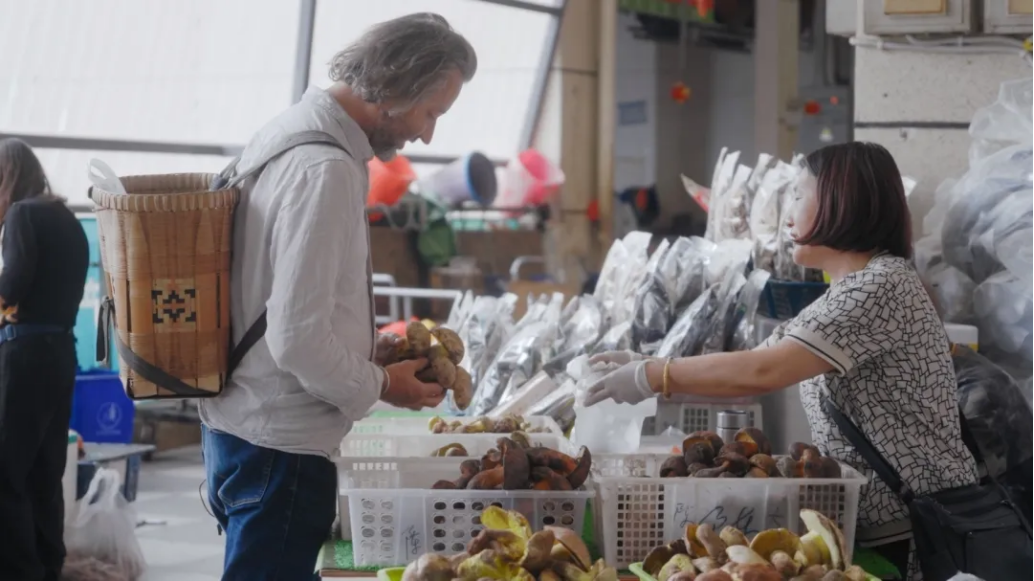
Gil gets some wild mushroom in Panqu Village in Dali, Yunnan.
Gil has found contentment in his current life, eager to weave the stories of the local villagers into his novels. “For two decades, I wandered the world, witnessing friendships bloom and fade, which left me feeling lost,” he reflected. “But Dali is different. It’s not a crossroads; it’s a place where I can finally put down roots.”
Lia (USA): Cherished memories, profound homesickness
By Zhang Min
A video of Lia, a Chinese-American girl living in Yunnan’s Puzhehei, has recently sparked discussion online. From her unique perspective, the video captures her affection for the land through scenes of mist-covered lotus ponds, wild mushrooms, and the children of Anuo Village. More than just visuals, it tells a heartwarming story of cultural integration and finding a sense of belonging.
The Lia family’s connection to Puzhehei began with a friendship with Wu Yizhu, owner of the “Three Cats Inn.” Its spacious courtyard, nights spent stargazing from wooden chairs, and warm conversations with villagers offered the “slow life” the Lia family craved. In June 2024, they journeyed to Puzhehei, where inn employee Yu’er greeted Lia with a welcoming hug. A photo of that moment now hangs above Lia’s bed in her Boston home, a testament to a bond that transcends distance.

Lia, a Chinese-American girl, lives in Yunnan’s Puzhehei.
Anuo Village in Puzhehei became Lia’s canvas for sensory exploration. She ventured into the ancient forest, finding the thrill of picking mushrooms amidst nature’s embrace. The vibrant morning market overwhelmed her with the vendors’ boisterous calls and the unexpected generosity of shared food, a stark contrast to sterile city supermarkets. Planting and harvesting vegetables with the inn staff, she felt a tangible connection to the earth, understanding “the symbiotic relationship between people and the land.” The gentle glide of a dugout canoe on the lotus pond awakened a deep-seated cultural resonance. It was the local school children, however, who truly captivated her: “Their purity is like dewdrops condensed from the mountains and lakes.”
During her month-long stay, Lia joined Yu’er in repairing window frames, tending to flowers, and enjoying evening strolls by the lake. Wu Yizhu observed, “Puzhehei has lost a traveler and gained a ‘villager’.” This immersion allowed Lia to redefine wealth: “Here, affluence is not measured by material possessions, but by the depth of culture, tradition, and interpersonal connections.”
Back in the United States, Lia penned a heartfelt piece expressing her “homesickness”: “The staff at the Three Cats Inn are already my family, and the scent of spices in the market, the reflection of mountains in the lake, reassure me that tranquility itself is power.” She now shares her experience widely, advising friends: “Only by stepping outside of your cultural comfort zone can you learn to understand the world from different perspectives.”
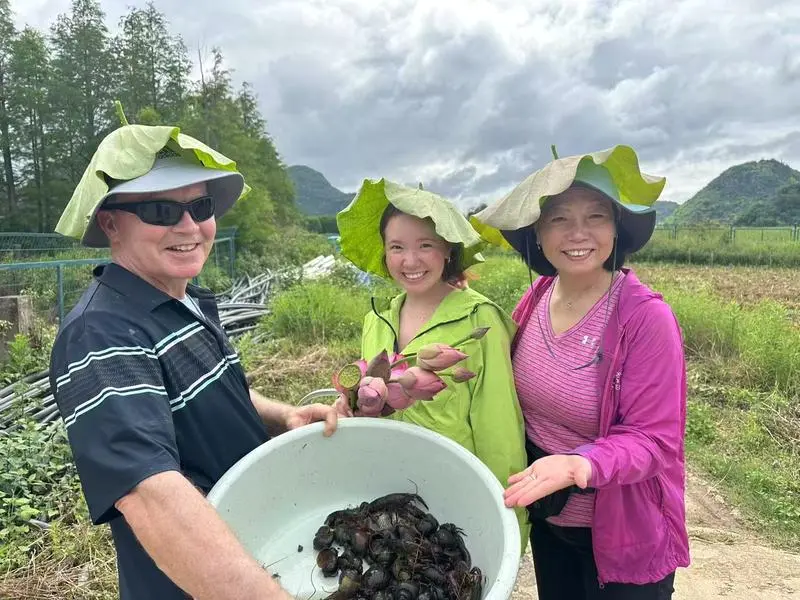
Lia, a Chinese-American girl, enjoys a pastoral life in Yunnan’s Puzhehei.
When an inn becomes a window for cultural dialogue, and a foreigner transforms into a “villager,” the distance between mountains and seas dissolves. Empathy, like ripples on a lotus leaf, transcends national borders.
Hiroto Goto (Japan): I hope more people become “New Yunnanese”
By Wang Jingzhong
“Yunnan boasts a pleasant climate, a rich and diverse culture, and a comfortable lifestyle. These attractions, combined with the many cultural similarities between China and Japan, solidified my decision to stay,” said Hiroto Goto.
Originally from Hokkaido, Japan, Hiroto Goto now teaches in the Japanese Department of Yunnan Minzu University. Having lived in Kunming for 16 years, he recounts that his connection with Yunnan began in the early 2000s.
“I was once a typical office worker in Japan. At 38, I decided to resign and travel the world,” Hiroto Goto explained. In 2004, after touring Southeast Asia, he entered China through Laos, arriving first in Xishuangbanna. He was immediately drawn to the region’s exotic scenery and ethnic culture, prompting him to explore the rest of Yunnan. He was particularly impressed by the stunning terraced fields in Honghe, which captivated him. By 2009, he had decided to settle down and make Yunnan his home.
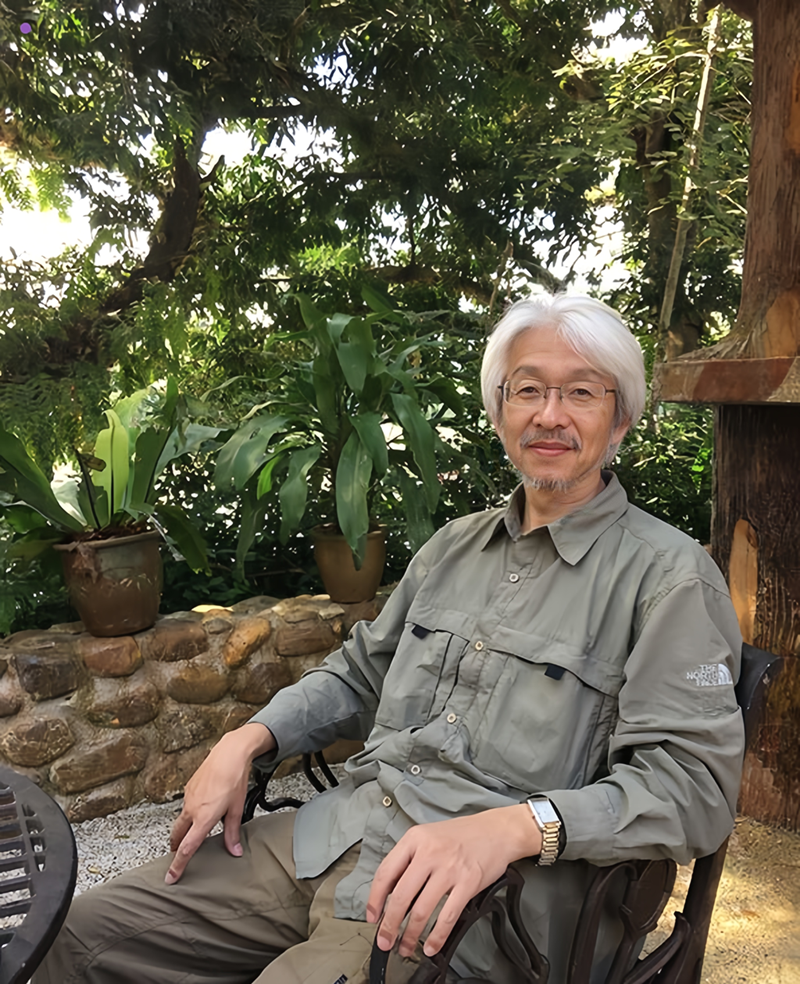
Hiroto Goto lives in Kunming for 16 years.
Beyond teaching, Hiroto Goto’s greatest passion is photography, particularly capturing the diverse minority cultures with his camera. “When I first arrived in Yunnan, my limited Chinese meant photos often became my means of communication with the locals. I remember displaying my photographs in villages and attracting crowds of curious onlookers,” he recalled. Living in Yunnan broadened Hiroto Goto’s perspective, and he feels fortunate to document the region’s vibrant minority cultures through his lens.
Over the years, Hiroto Goto and his Chinese wife have resided in Kunming. As China’s opening-up continues and urban development accelerates, Kunming is becoming increasingly appealing as a place to live. “The society is more stable, transportation is more developed, life is more convenient... these are all noticeable changes that have taken place in the city over the past decade,” Hiroto Goto observed.
Recently, “Yunnan-sojourn” has garnered increasing attention from people both domestically and internationally. Hiroto Goto is not surprised by this trend. “Years ago, I chose to stay here because of Yunnan’s vibrant minority cultures. I believe that in the future, still more people will fall in love with Yunnan and become ‘New Yunnanese.’”
Khounsavath Phetsamone (Laos): Finding harmony in the coffee and tea culture
By Chang Yuan
In 2022, Khounsavath Phetsamone, a resident of Vientiane, Laos, travelled by the China-Laos Railway for the first time to Yunnan for tourism. He was delighted by the ease of travel: “In the past, the journey home to China took two days. Now, it only takes five hours by high-speed train, allowing me to be back in time for dinner with my family.” This convenient “one-day living circle” inspired him to settle and build a career in China. That same year, after completing his master’s degree, Khounsavath joined Pu’er College as a Lao language teacher, beginning his “dual-city life” in Pu’er.

Khounsavath Phetsamone speaks at a event in Yunnan.
Initially, Khounsavath’s first impression of Pu’er was its lush, mountainous landscape. However, what truly captivated him was the local culture’s wisdom of living in harmony with nature. He was particularly impressed by the under-forest tea cultivation methods in the ancient tea forests of Jingmai Mountain, which demonstrated a fascinating ecological approach. “The respect for nature and the moderate use of resources by the various ethnic groups in Pu’er have given me a true understanding of sustainable development,” he remarked.
Pu’er College, a vibrant hub for intercultural exchange, has allowed Khounsavath to not only establish deep roots in his new home but also to flourish as an educator, nurturing students from diverse backgrounds. As a college situated along the China-Laos Railway, Pu’er College has, in recent years, trained numerous professionals proficient in Lao, Thai, and other less commonly used languages.

A view of Pu’er city in Yunnan
The school offers “language pus vocational skills” training programs and collaborates with Lao businesses to expand employment opportunities, providing valuable prospects for both international teachers and students. Khounsavath said, “The railway has not only shortened the geographical distance but has also normalized the flow of talent and cultural exchange.”
Now, Khounsavath has fully embraced the lifestyle of starting his day with a cup of Yunnan Arabica coffee and ending it with a pot of Pu’er tea. “Yunnan’s inclusivity has allowed me to find a harmonious balance between my career and personal life,” he shared.
Vincent (France): Embracing Yunnan life through terroir cuisine
By Wang Jingzhong
Vincent, a respected French chef in Kunming, hails from the Alsace-Lorraine region of eastern France. He now owns and operates “à Table!”, a French restaurant in Kunming. After calling Yunnan home for over eight years, he considers it his second home and passionately incorporates local ingredients and terroir into his culinary creations, resulting in a distinctive fusion cuisine.
In French culinary culture, “terroir” represents a unique and compelling concept, encompassing the symbiotic relationship between climate, soil, and the people who inhabit a region. Vincent believes a chef’s fundamental role is to harness the inherent qualities of ingredients through skillful cooking and a deep understanding of the local environment, thereby artfully showcasing the terroir on the plate.

Vincent takes his daughter to an outdoor exercise.
“The wet market is the ultimate classroom for understanding local terroir,” Vincent exclaimed with enthusiasm. On his days off, he enjoys exploring Kunming’s diverse wet markets on his motorcycle. Fish mint, taro flowers, Litsea cubeba, cilantro... Over the years, he has become intimately familiar with the ingredients favored by Yunnan locals. With the help of his wife, a Kunming native, and his friends, Vincent has even mastered the art of bargaining in Yunnan dialect.
Among Yunnan’s terroir, the wild mushrooms are undeniably unique. “Picking mushrooms in the forests near my childhood home in France was a favorite pastime, so I immediately felt at home with Yunnan’s termite mushrooms, boletus, and other varieties,” he said. He considers Yunnan’s rainy season a precious gift from nature, and the ultimate boon for chefs. Every August and September, he blends the freshest wild mushrooms with classic French techniques to create innovative fusion dishes, such as chicken braised in white wine with wild chanterelles, and slow-cooked lamb leg with white porcini mushrooms.
Vincent’s exploration of Yunnan is not confined to the kitchen. Whether he is climbing Haba Snow Mountain, camping near Lijiang, or hiking in the hills around Kunming, he finds solace and inspiration in Yunnan’s diverse landscapes, often sharing these experiences with his family and close friends.
“Food is my gateway to understanding, embracing, and integrating into Yunnan,” Vincent said with a smile. “But my journey of discovery here is just beginning.”
Translated by YNTA